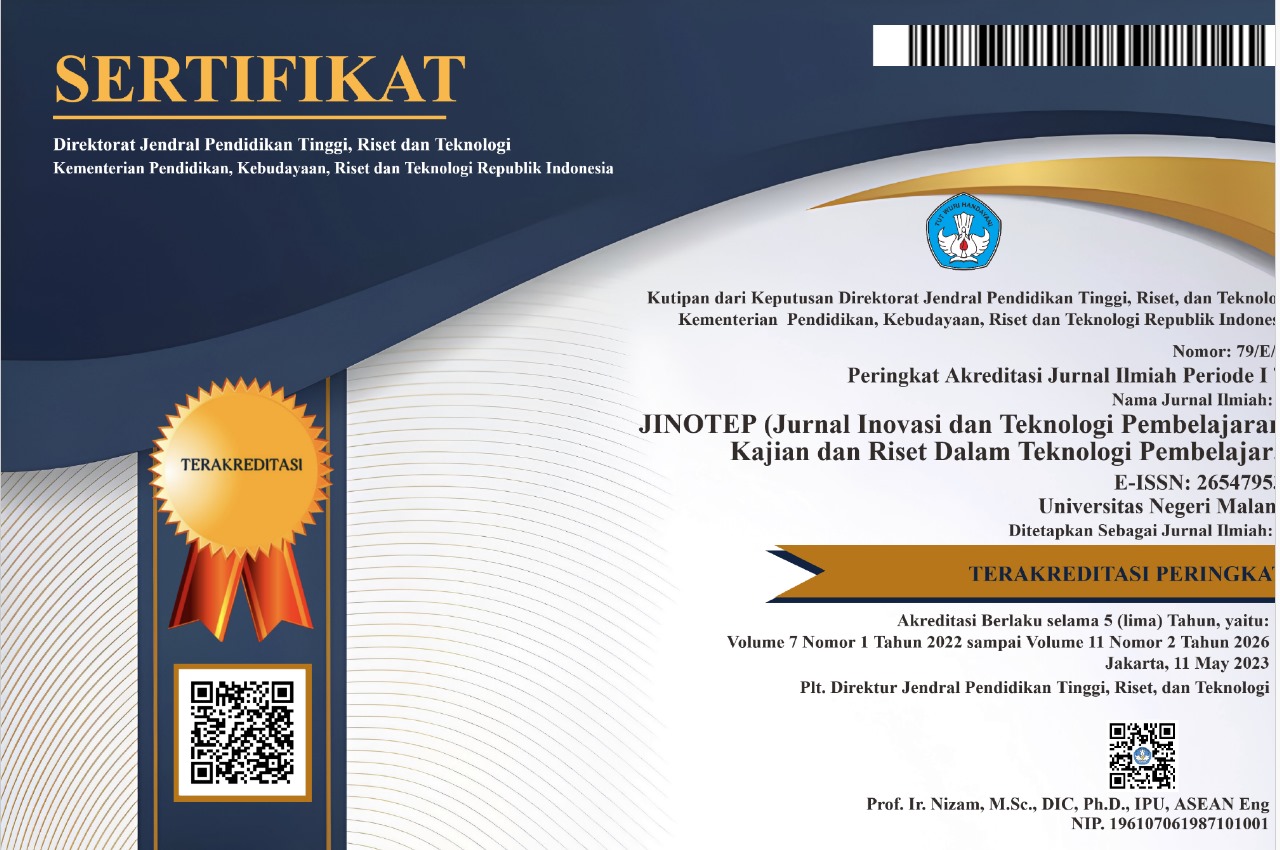Perangkat Pembelajaran Virtual Field Trip Berbasis Education For Sustainable Development Di Sekolah Dasar
Abstract
Abstrak: Tujuan dari penelitian ini untuk mengembangkan Virtual Field Trip berbasis Education for Sustainable Development (ESD) dalam bentuk aplikasi sebagai perangkat pembelajaran peserta didik. Pengembangan VFT menggunakan jenis penelitian yaitu penelitian dan pengembangan melalui tahapan (1) pengumpulan data, (2) desain produk, (3) validasi produk, (4) uji coba terbatas secara internal, (5) uji coba terbatas kepada peserta didik, (6) teknik analisis data. Teknik pengumpulan data diantaranya observasi, wawancara dan Focus Group Discussion (FGD) serta penilaian dari para ahli. Teknik analisis data diantaranya, reduksi, penyajian data dan kesimpulan. Hasil validasi produk oleh beberapa ahli menunjukkan bahwa aplikasi masih memerlukan perbaikan berupa pengurangan atau penambahan fitur. Maka, peneliti akan melakukan perbaikan pada produk sesuai saran dari para ahli, untuk menghasilkan produk yang layak digunakan. Pengembangan produk VFT sebagai sarana belajar mandiri peserta didik kapan saja dan dimana saja, tanpa batas ruang dan waktu.
Abstract: The purpose of this research is to develop a Virtual Field Trip based on Education for Sustainable Development (ESD) in the form of applications as a learning device for learners. VFT development uses the type of research and development through stages (1) data collection, (2) product design, (3) product validation, (4) internally limited trials, (5) limited trials to learners, (6) data analysis techniques. Data collection techniques include observation, interview and Focus Group Discussion (FGD) and assessments from experts. Data analysis techniques include, reduction, presentation of data and conclusions. Product validation results by some experts show that the application still needs improvements in the form of reductions or additions to features. So, researchers will make improvements to the product according to the advice of experts, to produce a product that is worth using. VFT product development as a means of self-learning learners anytime and anywhere, without the limits of space and time.
Keywords
Full Text:
PDFReferences
Anggraeni, R. D., & Kustijono, R. (2013). Pengembangan Media Animasi Fisika Pada Materi Cahaya dengan Aplikasi Flash Berbasis Android. Jurnal Penelitian Fisika Dan Aplikasinya (JPFA), 3(1), 11–18. https://doi.org/10.26740/jpfa.v3n1.p11-18
Becker, F & Karkow, H.A. (2020). Uso Da Ferramenta Kodular No Ensino De Matemática Para A Educação Básica. Journal Saber Humano, 10(17), 104-123. https://doi.org/10.18815/sh.2020v10n17.458
Brandt, J.O., L. Burgener, M. Barth, and A. Redman. (2019). Becoming a Competent Teacher in Education for Sustainable Development: Learning Outcomes and Processes in Teacher Education. International Journal of Sustainability in Higher Education 20 (4), 630–653. https://doi:10.1108/IJSHE-10-2018-0183
Fitria, A., & Hamdu, G. (2021). Pengembangan Aplikasi Mobile Learning Untuk Perangkat Pembelajaran Berbasis Education For Sustainable Development. Jurnal Inovasi Teknologi Pembelajaran, 8(2), 134-145. http://doi.org/10.17977/um031v8i22021p134
Hasslöf, H., & Malmberg, C. (2015). Critical Thinking as Room for Subjectification in Education for Sustainable Development. Environmental Education Research, 21(2), 239–255. https://doi.org/10.1080/13504622.2014.940854
Hedefalk, M., Almqvist, J., & Östman, L. (2015). Education for Sustainable Development in Early Childhood Education: a Review of the Research Literature. Environmental Education Research, 21(7), 975–990. https://doi.org/10.1080/13504622.2014.971716
Hoffmann, T., & Siege, H. (2018). What is Education for Sustainable Development (ESD)? Human Development, 1(8), 1–6.
Kasirah, I. (2015). Development of Teaching Materials Esd (Education for Sustainable Development) in Coaching Skills of Self Children With Intellectual Challenges in SMA LB C in Jakarta. Jurnal Ilmiah Pendidikan Lingkungan Dan Pembangunan, 16(02), 115–121. https://doi.org/10.21009/plpb.162.04
Melinda, V.A., Nyoman, S.D., & Dedi, K. (2017). Pengembangan Media Video Pembelajaran IPS Berbasis Virtual Field Trip (VFT) Pada Kelas V Di SDN Kratonkencong. Jurnal Inovasi dan Teknologi Pembelajaran, 3(2), 158-164. http://dx.doi.org/10.17977/um031v3i22017p158
Nasibulina, A. (2015). Education for Sustainable Development Springer International Publishing Switzerland 2017, 214, 1077-1082. http://doi.org/10.1007/978-3-319-42070-7_87
Padmanabhan, J. (2016). Does Integrated Approach to ESD Affect Critical Thinking on Sustainable Development? Journal of Education and Applied Social Studies, 7(3), 311–321. http://kr.cup.edu.in/handle/32116/350
Petersen, et al. (2020). The Virtual Field Trip: Investigating How to Optimize Immersive Virtual Learning in Climate Change Education. British Journal of Educational Technology. https://doi: 10.1111/bjet.12991
Pranatawijaya, V.H., Widiatry., Priskila, R & Putra, P.B.A. (2019). Pengembangan Aplikasi Kuesioner Survey Berbasis Web Menggunakan Skala Likert dan Guttman. Jurnal Sains dan Informatika, 5(2), 128-137. https://doi.org/10.34128/jsi.v5i2.185
Salsabila, U. H., Sofia, Dm. N., Seviarica, H. P., & Hikmah, M. N. (2020). Urgensi Penggunaan Media Audiovisual Dalam Meningkatkan Motivasi Pembelajaran Daring Di Sekolah Dasar. Insania: Jurnal Pemikiran Alternatif Kependidikan, 25(2), 284-304. http://ejournal.uinsaizu.ac.id/index.php/insania/article/view/4221/2281
Silalahi, M. (2015). Meningkatkan Konservasi Alam Melalui Materi Keanekaragaman Hayati Dan Kearifan Lokal Di Sekolah. Jurnal Dinamika Pendidikan, 8(1), 35-42.
Sudaryono. (2018). Metodologi Penelitian Kuantitatif, Kualitatif, dan Mix Method (Kedua). PT Rajagrafindo Persada.
Sugiyono. (2012). Metode Penelitian Pendidikan (Pendekatan Kuantitatif, Kualitatif, dan R&D). Alfabeta.
Surahman, E & Surjono, H. D. (2017). Pengembangan adaptive mobile learning pada mata pelajaran biologi SMA sebagai upaya mendukung proses blended learning. Jurnal Inovasi Teknologi Pendidikan, 4(1), 26-37. http://journal.uny.ac.id/index.php/jitp
Sriarunrasmee, J., Suwannatthachote, P., & Dachakupt, S. (2015). Virtual Field Trips with Inquiry learning and Critical Thinking Process: A Learning Model to Enhance Students’ Science Learning Outcomes. Jurnal Procedia-Social and Behavioral Sciences, 197(2015), 1721-1726. https://doi.org/10.1016/j.sbspro.2015.07.226
Syaparuddin, S., & Elihami, E. (2020). Peningkatan Motivasi Belajar Siswa Melalui Video pada Pembelajaran PKn di Sekolah Paket C. Jurnal Edukasi Nonformal, 1(1), 187–200. https://ummaspul.e-journal.id/JENFOL/article/view/318
Tarigan, I. J., Sihombing, P., Sirait, P., Sembiring,R. W., & Simanjuntak, H. E. (2019). Embedding the Operating System : A Case Study LMDE 3 on a USB Flash Drive. Journal of Physics: Conference Series, 1361(1), 1–7. https://doi.org/10.1088/1742-6596/1361/1/012025
Timm, JM & Bartha, M. (2020). Making Education For Sustainable Development Happen In Elementary Schools: The Role Of Teachers. Environmental Education Research, 27(1), 1-17. https://doi.org/10.1080/13504622.2020.1813256
UNESCO. (2012). Education for Sustainable Development. United Nations Educational, Scientific and Cultural Organization.
UNESCO. (2015). Rethinking Education Towards a Global Common Good. United National Educational, Scientific and Cultural Organization.
UNESCO. (2017). Education for Sustainable Development Goals Learning Objectives. Peace and Sustainable Development, Education Sector.
DOI: http://dx.doi.org/10.17977/um031v9i12022p001
Refbacks
- There are currently no refbacks.
Copyright (c) 2022 Rahmania Zahara, Ghullam Hamdu

This work is licensed under a Creative Commons Attribution-ShareAlike 4.0 International License.
======================================================================
Jurnal Inovasi dan Teknologi Pembelajaran published by Universitas Negeri Malang in collaboration with the Asosiasi Program Studi Teknologi Pendidikan Indonesia (APS TPI) and Ikatan Profesi Teknologi Pendidikan Indonesia (IPTPI) with a MoU.
Publisher Address:
Educational Technology Laboratorium, Building D5, 1st Floor
Faculty of Education, Universitas Negeri Malang
Semarang St. No. 5, Malang City, East Java Province, Postal Code 65145
Email: jinotep.fip@um.ac.id
======================================================================

JINOTEP is licensed under a Creative Commons Attribution-ShareAlike 4.0 International License.
JINOTEP Statistics (Since July 13th, 2020)



.png)




.png)
1.png)
1.png)
4.png)
2.png)
1.png)
1.png)
.png)


_3.png)





1.png)
.png)